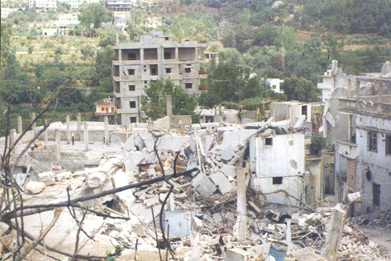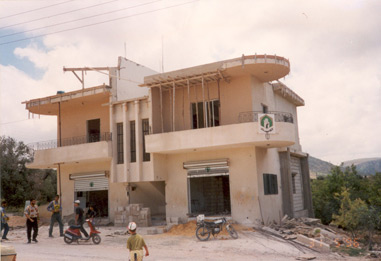|
|
The
restoration after the year 1996 aggression: the
so-called war of «Grapes of Wrath»
In April 1996, the nature endows an abundant
spring on the slopes of the south and the Bekaa,
and inhabitants were deploring in their fields,
in order to cultivate the land, and in the
horizon there was a hope for a shiny tomorrow,
and the victory is coming, and the boys in their
neighbourhoods playing soccer, the girls singing
with the birds the morning April Songs, on this
day the Zionist enemy surprised the people, boys
and girls, with a huge shells of bombing and
aversion of his plot, and in tons of explosive
rockets, which cut the nation apart, turning the
dreamy bodies into pieces.
This enemy who attacked a bus full of children
in Nabatiyeh, and did not forgot attacking the
ambulance of life in Mansoury, it has attacked
with his full capacity destroying everything he
has from shells and missiles targeting the
ground all parts in Lebanon, roads, bridges,
water systems, electricity, telephone, and the
list goes on.

Lebanon has lived through the attack of April, a
harsh and hot day, because of lack of water and
electricity, almost like the hot of July and
August which we received their flames ten years
after.
Sixteen days, and Lebanon bears the balls of
fire, and the martyrs were registered in a long
list, and the wounded in big lines to hospitals
and the population were displaced from their
homes, waiting for the victory sign to return to
their villages.
After the defeat of the enemy, and endorsing the
right of the Resistance to defend Lebanon, and
the right of the Resistance to respond to any
aggression, this recognition which the
Resistance grabbed by force from the enemy, that
was considered an emblem of a firm declare
victory.
The people returned to their homes, and the
destruction has changed the features of their
villages, and the dust of the universe gathered
above them, the population woke up on the
twenty-eighth of April, 1996, at the very end of
the aggression, only to find that more than 120
villages have been completely destroyed, and
more than 5500 building was demolished, as well
as dozens of mosques, churches and schools, as
for the agricultural losses were unable to be
counted by the people...
In front of this reality, where the rubble of
destruction and dismemberment of the roads, the
Organization of Jihad Al-Binaa initiated to
fight the odds, setting operational plans in
order to intervene immediately through the
mobilization of all its subsidiaries. In order
to alleviate the tragic situation of the
compressor to the displaced initiating several
actions:
• Equipping the schools in Beirut and its suburb
with basic facilities, and convert them to safe
havens to shelter the displaced and to
facilitate the humanitarian access to them and
ease their pain.
• Ensuring drinking water, service and food.
• Ensuring the health and environmental
components of their new innovative homes.
When His
Eminence the Secretary General of Hezbollah
Sayyed Hassan Nasrallah called on April 28,
1996, to initiate the reconstruction procedure
of all that was destroyed by Israeli machines of
destruction, the Organization of Jihad al-Binaa
initiated to implement the project of
reconstruction and restoration, in order to
expedite a dignified and decent return for the
displaced which will have a similar value of the
dignify victory achieved by the Mujahedeen
Resistance fighters.

This initiated operation of reconstruction and
repairs was a major challenge for the
Organization, given the size of the massive
destruction, which is unparalleled up to that
time. We established and administrative
technical committee that consist of 130
engineers and administrators, who carried out
the initial survey for each of the devastated
areas, where we did find that 120 villages and
towns in the south and the Bekaa have been
completely destroyed.
In order to beneficiate from the time, and
accelerate the return of devastated population
to resume their normal life, the Organization of
the restoration project divided the affected
areas according to geographic zones, were:
Beirut, the Bekaa, Bent Jbeil, Tyre, Nabatiyeh.
The table shows the number of homes renovated in
the geographical zones in accept churches,
mosques and public facilities
|
# |
Region |
the number of the restored
commercial centers |
the number of the renovated homes |
the number of villages and towns
affected |
|
01 |
Tyr |
26 |
906 |
115 |
|
02 |
Bent Jbeil |
39 |
1382 |
238 |
|
03 |
Nabatieh |
28 |
1525 |
400 |
|
04 |
La Bekaa
|
8 |
156 |
30 |
|
05 |
Beyrouth
|
1 |
248 |
20 |
|
Totals
|
102 |
4217 |
803 |
The agricultural damage, was
not less than the destruction, more than 150,000
chicken, goats and 660 sheep, goats, cows were
dead, and the burning of tens of thousands of
fruit trees and tents as well as agricultural
and non-bearing trees, and the burning of forest
land. |